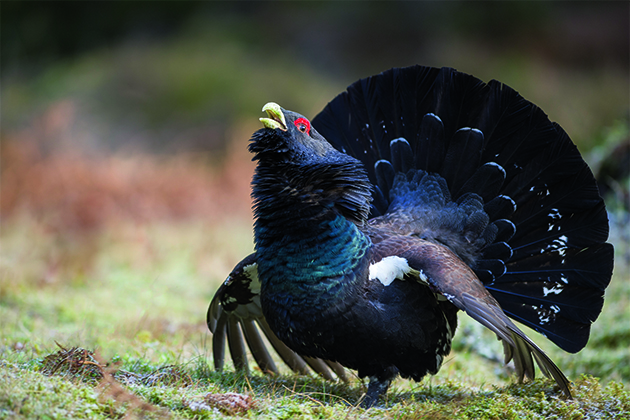RSPB blames ‘wet spring weather’ for caper crisis
The claim has baffled keepers, who believe booming predator numbers are the primary driver behind the capercaillie's castrophic decline.

The RSPB's latest capercaillie survey found that just 542 of the birds remain in the wild in Scotland
Gamekeepers and land managers have expressed bafflement after RSPB Scotland blamed wet spring weather for the catastrophic decline in capercaillie numbers. (Read more on the plight of the capercaillie.)
The claim follows the publication of the results of the organisation’s latest capercaillie survey, which found that just 542 of the birds remain in the wild in Scotland. This year’s survey is the sixth national count of the birds, with counts having taken place every six years for nearly four decades. The survey team searched for feathers, droppings and the birds themselves in Badenoch and Strathspey, Easter Ross, Morayshire, Nairnshire, Deeside and Perthshire.
The survey adds to the already large body of evidence that capercaillie are in serious decline with almost three quarters of the population having disappeared since the 2003/2004 survey. RSPB Scotland, which led the survey work, blamed the declines on factors “ranging from cold, wet spring weather impacting the fitness of female birds before the breeding season and affecting chick survival, along with predation and disturbance.”
However, keepers and land managers were incredulous that so much emphasis was being put on the weather rather than on booming pine marten and badger populations. They pointed out that wet springs also have a bad effect on red grouse numbers, but that there have been many better years in which they have bounced back.
Ian Coghill, author of Moorland Matters, said: “Everyone knows that this species needs immediate protection from protected predators whose numbers are increasing, but they would rather see the bird become extinct than do something about it.”
Veteran keeper and rural campaigner Bert Burnett saw politics as the underlying issue. Mr Burnett explained: “The RSPB doesn’t want its name attached to reducing pine marten or possibly badger numbers, and the RSPB has already distanced itself and has stopped killing foxes on Abernethy. Meanwhile, the Cairngorms National Park Authority is fast distancing itself from killing foxes and crows.”
Other practical conservationists pointed out that tree-planting programmes which involved fencing deer out had prevented forests from developing the open canopy and bilberry undergrowth that capercaillie need.








